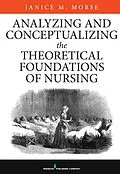Delivers all information required for the Theoretical Foundations of Nursing course
By embracing the major conceptual and theoretical contributions to nursing research that are outside of traditional nursing theory, this book serves as a vital resource for nurse researchers, and one that is indispensable for doctoral nursing students embarking on their dissertations. Containing the full complement of information required for the Theoretical Foundations of Nursing course for PhD programs, the text supports the foundational skills needed for excellence in research and scholarship. The book examines in depth the components of nursing theory and the types of theory used in nursing research and practice, and teaches students about the nature and use of concepts and the development of critical thinking skills that are essential for nursing research.
This text contains information for developing concepts and middle-range theory, using a variety of qualitative research methods, broadening theoretical scope by linking middle-range theories, and moving knowledge toward certainty by use of evidence. It also illustrates the construction of frameworks for quantitative inquiry, exploring theory in mixed-method design and how theory develops knowledge. Each method includes a description of the methodological approach and examples of subsequent concept or theory development. The text includes several methods for the development of concepts, micro- and mid-range theories using qualitative research, and a discussion of the new trend of moving these qualitative theories toward practice-based evidence. Each section of the book contains practical examples and supplementary activities that encourage inquiry. An instructor's manual is included for adopters of the text.
Key Features:
- Teaches the significance of and foundations of perspective, concepts, qualitatively derived theory, quantitative frameworks, quantitative theoretical development, knowledge development from research, application, and evidence
- Focuses on current nursing research and how it is used in practice today
- Demonstrates the significant relationship between theory, research, knowledge development, evidence, and practice
- Promotes excellence in scholarship and research
- Includes an extensive instructor's manual
Autorentext
Janice M. Morse, PhD (Nurs), PhD (Anthro), FCAHS, FAAN, is a professor and Barnes Presidential Chair, College of Nursing, University of Utah, Salt Lake City, and professor emeritus, University of Alberta, Edmonton, Canada.
Inhalt
CONTENTS
Contributors
Preface
Acknowledgments
SECTION I: DESPERATELY SEEKING THEORY
1. The Fringes of Knowledge
Janice M. Morse
The Science of the Art
Exploring the Fringes: The Clinical Utility of Concept Inquiry
The Essentialness of Examining Our Practice
Why Do We Have to Know?
The Role of Values in Developing Knowledge
The Rise of Nursing Research and the Use of Frameworks and Models
2. Where We Came From
Janice M. Morse
Chasing Nursing Theory
The Need for Nursing Theory
The Need for Nurse Scientists
The Need for Nursing Concepts
Mid-Range and Situation-Specific Theories
The Need for Nurse Educators
The Performance and Products of Nurse Researchers
Nursing Theory for Directing Nursing Actions for Patient Care
The Gap Remains
Did We Forget?
Where Are We Now?
Where Are We Going?
3. Seeing What We Know: Knowing What We See
Laura Bohannan
Shakespeare in the Bush
4. Incorporating Theory Into Practice Research
Janice M. Morse
Scenario
Nursing Perspectives
Dialogue
Discussion
5. Orientation 101: Definitions and Other Essential Extraneous Notes
Janice M. Morse
Paradigm
6. The Battlefield of Knowledge: Different Purposes, Different Approaches
Janice M. Morse
Inductive Approaches to Concept Development
Deductive Approaches to Concept Development
Developing Quantitative Models and Theories
Abduction
The Complementary Relationship Between Qualitative and Quantitative Knowledge
Last Thoughts
SECTION II: ALL ABOUT CONCEPTS
The Conceptualization of Concepts
7. Concepts in Context
Janice M. Morse
What Is Context?
What Is a Concept?
Behavioral Concepts
The Structure of Concepts
The ?Anatomy? of Concepts
Recontextualization
The ?Physiology? of Concepts
Types of Concepts
Approaches to Understanding Concepts
The Contribution of Concepts
Frameworks and Models
Theory
Last Words
8. Summary of Major Methods for Exploring Concepts
Janice M. Morse
Philosophical Methods for Concept Analysis
Meta-Analytic Methods
Combined Methods: Methods Using the Literature and Qualitative Data
Methods Using Qualitative Inquiry
Summary
9. Inductive?Deductive Pitfalls in Concept Development
Janice M. Morse
The Myth of Induction
Exploring Qualitatively Derived Concepts: Inductive Techniques
Summary
10. The Pink Elephant Paradox (or, Avoiding the Misattribution of Data)
Judith A. Spiers
The Importance of Nurse?Patient Communication
The Concept of Vulnerability
Exploring Vulnerability in Home Care Nurse?Patient Interactions
Summary
11. Concept Evaluation: Determining Appropriate Strategies for Concept Development
Janice M. Morse
Determining Level of Maturity
The Process of Assessing Concepts
The Level of Maturity
SECTION III: EMERGING CONCEPTS
12. Qualitative Strategies for Concept Development
Janice M. Morse
Targeting Concepts Using Qualitative Inquiry
Building Lay Concepts Epistemologically
Qualitative Methods for Developing Concepts
A Mapping Method to Locate a Concept
Kristy K. Martyn
Qualitative Strategies for Identifying Concepts
Example of Interpretative Coding: Getting Behind the Data
Janice M. Morse, Kim Martz, and Terrie Vann-Ward
Analytic Strategies for Identifying Attributes
Qualitative Research Strategies for Expanding Concepts
Summary
13. Concept Identification Using Qualitative Inquiry
Janice M. Morse
Developing a Concept From Data: The Example of Compathy
Role of Compathy in Knowledge Development
14. Building Concepts
Janice M. Morse
Concept-Supporting Data
The Data?Concept Link
Developing Concepts to Using Studies to Support an Emerging Concept
Emerging Concepts
The Case of ?Preserving Self?
Summary
15. Qualitative Structured Techniques
Janice M. Morse
Targeted Strategies for Concept and Attribute Development
Summary
16. The Prototypical Method
Janice M. Morse
The Prototypical Method
The Case of Hope
Summary
SECTION IV: PARTIALLY DEVELOPED CONCEPTS
17. Concept Clarification: The Use of Pragmatic Utility
Janice M. Morse
Procedures: Doing Pragmatic Utility
18. Research Using Pragmatic Utility
Janice M. Morse
Example I: Concept Clarification Inside a Concept: The Conceptualizations of Caring and Caring as a Concept
Comparing the Conceptualization…
